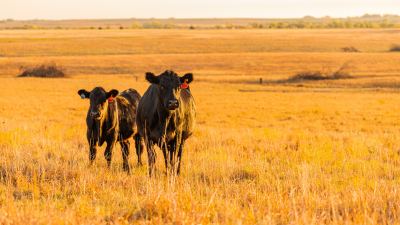Raising calves or kids: Which is harder?

“Raising kids isn’t that hard…right?” says someone who has clearly never parented a child before. But is parenting harder than raising healthy calves?
Try having that argument with a producer who has 400 individual cow-calf pairs — not just one or two kids — in the middle of calving season. From the stress to the unpredictability to the effect on his or her bottom line, calving is undoubtedly tough. But the reality is that it’s not fair to compare the two. Parenting children and raising calves are incredible gifts and incredible challenges.
But why do some calves and some kids turn out well while others do not? Is it luck? Or is it something else?
Many beef producers attribute a good batch of calves to favorable weather, a strong market or a list of other factors. Parents, meanwhile, spare no detail (or expense) in attempting to raise healthy and successful kids.
Is it possible for us to pull some truths from parenting that apply to raising calves?
Parenting truths that (wildly enough) also apply to cattle
1) Kids (and calves) need a nurturing environment.
From the moment a mom-to-be learns that a baby is on the way, everything in her life begins to change as plans are made for the newest addition to the family. A bedroom is prepared, a crib is set up and everything the mom eats and drinks is taken into account to prepare for the baby. Parents do all that they can to protect their child and establish a good foundation so he or she can be as healthy and strong as possible.
The same logic can and should be applied to calving. First, from a management standpoint, everything needs to be done to assure the comfort and safety of the cow. This means providing sufficient bedding, creating a clean, bad bacteria-limiting environment and reducing external stresses at all costs for the sake of the new calf.
Nutrition is a second critical component of any healthy calving program. Similar to how many moms-to-be take prenatal vitamins, a quality mineral and nutritional program — especially in the final four to six weeks of pregnancy — is key to delivering quality calves. Technologies such as Bioplex®, Sel-Plex®, Bio-Mos® and Actigen® can all play a central role in a healthy cow-calf management program. Bioplex and Sel-Plex are organic trace minerals formulated to promote the optimal mineral status for cows, which is critical for ensuring immunity and the adequate transfer of nutrients to the calf. Additionally, Bio-Mos and Actigen are industry-leading technologies used to optimize gut health and promote good bacteria both in cows and their calves.
A healthy gut in the cow leads to improved colostrum quality, the all-important first drink for calves that can jumpstart their natural health defense and support overall immunity. Particularly during the first 24–72 hours of a calf’s life, when it must absorb whole proteins, reinforcing nutrient status through technologies like Bio-Mos and Actigen can promote life-long health, which is good news for both the cow and the calf.
2) Even when times are tough, parents (and producers) must trust the process.
There’s a reason they call it the “terrible twos,” and most parents vividly remember their kid’s first out-of-control public temper tantrum. The kicking, the screaming, the unwanted stares from other parents — those moments are intense (especially for a first-time parent), but they can provide insight for cow-calf producers. Parents know this behavior is all part of growing up and requires dedicated, steady and loving parenting.
Every few years, it seems the market for cattle hits a peak high or an all-time low. In both the high and low moments (like when a kid is screaming in public), it is important to remember the impact of tried-and-tested methods, not just the latest fad or quick fix, to drive long-term profitability.
One factor for success in cattle production is using comprehensively researched feed ingredients like Bio-Mos and Actigen. Reviewed in over 734 accredited studies in all production animal species, Bio-Mos and Actigen have more than 20 years of market presence to back their ability to promote both health and profitable returns. By being proactive and utilizing nutrition as a management tool, much like good parenting strategies, an overall platform for success can be created.
3) Kids don’t magically turn into adults at age 18. Calves aren’t automatically ready for the feed yard.
Every parent’s “special little guy or girl” doesn’t simply wake up as a healthy, smart, successful adult on his or her 18th birthday. Every successful adult was molded and nurtured every day for 18 years by those around him or her, especially their parents, before being sent off into the world.
Interestingly, the world of cattle production can and should function the same way. The goal of cow-calf production is to generate healthy, strong calves that can perform well when they are sent off for feedlot production, much as young adults are prepped in school to enter the workforce.
For cattle about to enter the feed yard, this may take shape in a few different ways. Nutritionally, it can be reinforced by developing a strong mineral program throughout the calf’s life, especially during the weaning and backgrounding stages, with technologies like Bioplex and Sel-Plex. A strong mineral base prepares cattle for the new feedlot environment and ensures that they produce profitably. Furthermore, management issues, such as shipping stress, can be accounted for by supplementing the diet with electrolytes to reinforce receiving status.
The connection between calves and kids/producer and parent is closer than we think. As producers, we provide some of the healthiest, best-tasting beef we can for our communities, friends and families. We also desire to feed and nurture children in such a way that they can grow up to become healthy, productive adult members of society.
Let’s continue to raise our cattle and kids with the kind of care that benefits us both today and for generations to come.
For more information on our full range of nutritional solutions, please visit www.alltech.com or contact us directly by messaging beef@alltech.com.















